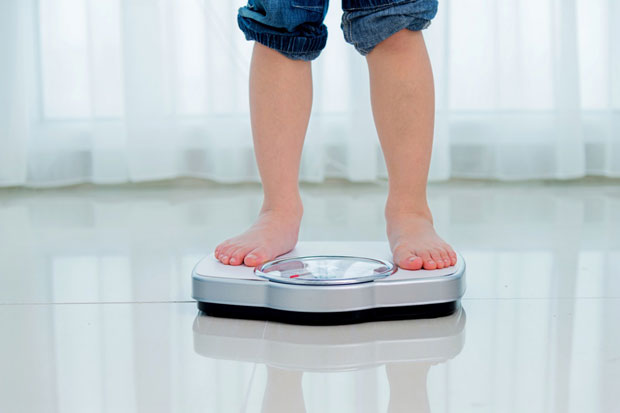01 Dec 2017 - {{hitsCtrl.values.hits}}

 In the current day and age children lead sedentary lifestyles and have more access to fast food, making gaining weight a serious health issue. Body Mass Index (BMI) is a calculation made by taking into account the height and weight of a child. BMI assesses whether or not the child is overweight. According to Dr. Kosala Karunaratne, Consultant Pediatrician, Lady Ridgeway Hospital, BMI is the gauge used to check obesity worldwide. It is one of the best indicators when dealing with the children’s health.
In the current day and age children lead sedentary lifestyles and have more access to fast food, making gaining weight a serious health issue. Body Mass Index (BMI) is a calculation made by taking into account the height and weight of a child. BMI assesses whether or not the child is overweight. According to Dr. Kosala Karunaratne, Consultant Pediatrician, Lady Ridgeway Hospital, BMI is the gauge used to check obesity worldwide. It is one of the best indicators when dealing with the children’s health.
What this indicator represents
Speaking about the relevance of BMI, Dr. Karunaratne said,“It’s the gauge we use to check obesity worldwide. In children, BMI is one of the best indicators for obesity. The important thing is you have to use the relevant age and gender charts. You should be careful about not checking the adult chart. The children’s and adult’s charts are different because children are growing therefore their BMI is always changing. The BMI is determined by taking into account the height and the weight. If it isn’t checked by the proper chart, it is not accurate,”Dr. Karunaratne said.

He further said,“BMI is different from children to adults. It depends on the age and the gender of the child. And we usually check the BMI between 2 to 18 years. There are special charts in that age group. Depending on the child’s age and gender there are separate charts. In fact these charts are included in the child health records, which all Sri Lankan children possess. This isn’t the normal growth chart. There is a BMI chart in medicine as well. Some health professionals aren’t aware of the fact that this book contains a BMI. The BMI of the child can easily be checked through this. You can calculate the child’s BMI or you can download an app as a BMI calculator, so you don’t have to calculate manually. So what you do is check the child’s age. If the child is a girl or a boy check the BMI. Depending on the BMI you can classify them as either obese or overweight,” the doctor said.
Speaking about the values of BMI, Dr. Karunaratne said, “Between the 50th and 85th percentile, they are overweight. Over the 85th percentile they are obese. The children who are overweight are at risk of becoming obese. You don’t usually check the BMI for children under 2 years, but you check their weight per age and see whether they are overweight. These height and weight charts are also available in the child health records. If a child is overweight you have to be cautious. If the child becomes obese, such children are exposed to many health risks, both during childhood and adulthood. So it’s very important to screen them for obesity and take necessary action,” Dr. Karunaratne said.
Having a high reading
Having a BMI over the 85th percentile indicates that your child is obese. Dr. Karunaratne went on to explain the complications that occur due to obesity in childhood.“Obese children can have many medical complications as well as psychological complications. Some of the medical complications during childhood are; they can develop a condition called metabolic syndrome (which is where their cholesterol and sugar can rise) or they can even develop high pressure and cardiac diseases, even during childhood. And they also run a high risk of developing all of these conditions in their adult life as well. In addition to this they have a high risk of developing asthma and also sleep disorders. Such individuals during sleep can have obstructions. And due to being overweight they can experience joint problems. There are other complications. They can also develop psychological problems. They can be bullied and some of them can develop depression and psychiatric problems,” the doctor explained.
“Obesity is almost like a global epidemic. The most effected by this condition are children. Because of fast food and TV games children nowadays are leading very sedentary lifestyles. As a result they lack exercise. In the olden days children used to play on the road with the neighbourhood children. But they don’t do this anymore. And most of the urban families have a higher risk of having obese children. That is because the parents are also busy and working. They have no time to give nutritious meals to their children, so they buy fast food.” he continued.
Lowering your energy intake
Speaking on how one must lower the BMI, Dr. Karunarante explained that you simply have to ‘lower your energy intake compared to your energy expenditure’. “Energy intake is your food and the expenditure is your activity. The main way to control the energy intake is through your diet. So you have to control the diet. Food with nutritional value with less refined sugar- present in sweets- and sugar added into tea must be given. And if the child is consuming carbohydrates it’s better to take what is called wholemeal, which has more fiber such as brown rice and brown bread. They don’t cause a very high rise in blood sugar like wheat does. This is how blood sugar works. When you consume a lot of sugar your blood sugar rises. Then you have a hormone called insulin, and as a response to this the insulin rises. What the insulin does is deposit these sugars as fat in your body. But when you take wholemeal carbohydrates the insulin won’t rise erratically. This is one of the main physiological reasons as to why a person gains weight. Since diet is a problem, you have to have a balanced diet comprising proteins, carbohydrates and lipids. You should use a food plate where you can balance the vegetables, proteins, carbohydrates etc. Fast food should be avoided. All fast food contain high sugar, thus the presence of many calories. Avoid carbonated drinks which also have a much sugar,” he affirmed.
“With regard to energy expenditure you have to make your child more active. The WHO has advised that the child should have at least 60 minutes of moderate to high rate exercise for a day. That is active play. It is very important that the family is healthy. It is up to the parents to buy good nutritious food and lead a healthy lifestyle,” he continued.
“In our culture we think that if the child has a good weight they are healthy. And parents don’t take the child to the pediatrician. Some say, “Ah this child is nice and chubby and there is nothing wrong with him/her”. They aren’t aware of serious medical problems that children can develop when they reach adult age. And they tend to do nothing about it and then the overweight condition leads to obesity. This is a preventable problem,” he concluded.
23 Dec 2024 2 hours ago
23 Dec 2024 2 hours ago
23 Dec 2024 2 hours ago
23 Dec 2024 3 hours ago
23 Dec 2024 4 hours ago